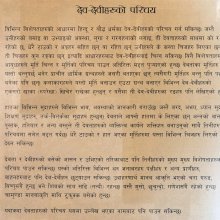Kuṇa, Kuna, Kuṉā, Kunā: 10 definitions
Introduction:
Kuṇa means something in Hinduism, Sanskrit, Buddhism, Pali, Jainism, Prakrit, biology, Tamil. If you want to know the exact meaning, history, etymology or English translation of this term then check out the descriptions on this page. Add your comment or reference to a book if you want to contribute to this summary article.
Images (photo gallery)
Biology (plants and animals)
Source: Google Books: CRC World Dictionary (Regional names)Kuna in Mali is the name of a plant defined with Strophanthus sarmentosus in various botanical sources. This page contains potential references in Ayurveda, modern medicine, and other folk traditions or local practices.
Example references for further research on medicinal uses or toxicity (see latin names for full list):
· Bull. Soc. Philom. Paris (1802)
· Curtis’s Botanical Magazine (2000)
· Nigerian Journal of Natural Products and Medicine (1997)
If you are looking for specific details regarding Kuna, for example chemical composition, pregnancy safety, diet and recipes, side effects, health benefits, extract dosage, have a look at these references.

This sections includes definitions from the five kingdoms of living things: Animals, Plants, Fungi, Protists and Monera. It will include both the official binomial nomenclature (scientific names usually in Latin) as well as regional spellings and variants.
Languages of India and abroad
Pali-English dictionary
Source: Sutta: The Pali Text Society's Pali-English DictionaryKuṇa, (adj.) (cp. kuṇi lame from *qer, to bend=Gr. kullόs crooked and lame, Lat. curvus & coluber snake) distorted, bent, crooked, lame Pv. II, 926 (v. l. kuṇḍa; cp. PvA. 123. kuṇita paṭikuṇita an-ujubhūta); DhA. III, 71 (kāṇa° blind and lame). (Page 220)

Pali is the language of the Tipiṭaka, which is the sacred canon of Theravāda Buddhism and contains much of the Buddha’s speech. Closeley related to Sanskrit, both languages are used interchangeably between religions.
Sanskrit dictionary
Source: Cologne Digital Sanskrit Dictionaries: Monier-Williams Sanskrit-English Dictionary1) Kuṇa (कुण):—m. a kind of insect living in clothes
2) dirt on the navel, [Demetrius Galanos’s Lexiko: sanskritikes, anglikes, hellenikes]
3) (ifc. with aśvatthapīlu, and other names of trees or flowers) the time when a plant bears fruit, [Pāṇini 5-2, 24.]
Source: Cologne Digital Sanskrit Dictionaries: Yates Sanskrit-English DictionaryKūna (कून):—[(ka-t) kūnayati] 10. a. To contract, or close.
Source: DDSA: Paia-sadda-mahannavo; a comprehensive Prakrit Hindi dictionary (S)Kūṇa (कूण) in the Sanskrit language is related to the Prakrit word: Kūṇa.
[Sanskrit to German]
Sanskrit, also spelled संस्कृतम् (saṃskṛtam), is an ancient language of India commonly seen as the grandmother of the Indo-European language family (even English!). Closely allied with Prakrit and Pali, Sanskrit is more exhaustive in both grammar and terms and has the most extensive collection of literature in the world, greatly surpassing its sister-languages Greek and Latin.
Prakrit-English dictionary
Source: DDSA: Paia-sadda-mahannavo; a comprehensive Prakrit Hindi dictionaryKūṇa (कूण) in the Prakrit language is related to the Sanskrit word: Kūṇa.
Prakrit is an ancient language closely associated with both Pali and Sanskrit. Jain literature is often composed in this language or sub-dialects, such as the Agamas and their commentaries which are written in Ardhamagadhi and Maharashtri Prakrit. The earliest extant texts can be dated to as early as the 4th century BCE although core portions might be older.
Kannada-English dictionary
Source: Alar: Kannada-English corpusKuna (ಕುನ):—
1) [noun] the vine Piper longum of Piperaceae family.
2) [noun] a pungent condiment obtained from the small, dried fruits of this vine.
--- OR ---
Kūna (ಕೂನ):—
1) [noun] = ಕೂನ್ [kun]2.
2) [noun] a hump-backed man.
3) [noun] the quality, condition or fact of being dwarfish; dwarfishness.
--- OR ---
Kūna (ಕೂನ):—[noun] a sign, indication or symbol; a token.
Kannada is a Dravidian language (as opposed to the Indo-European language family) mainly spoken in the southwestern region of India.
Tamil dictionary
Source: DDSA: University of Madras: Tamil LexiconKuṉā (குனா) noun < Urdu gunāh. Fault, crime; குற்றம். [kurram.] (W.)
Tamil is an ancient language of India from the Dravidian family spoken by roughly 250 million people mainly in southern India and Sri Lanka.
See also (Relevant definitions)
Full-text (+158): Khadirakuna, Badarakuna, Kuna-kunasamm, Bhatakana, Kun, Unkuna, Karirakuna, Ashvatthakuna, Karkandhukuna, Shamikuna, Kunavatan, Bere kuna, Kunacahim, Kulambata, Kulambihisheba, Kulambi, Iracokunam, Fura kuna, Kulambau, Kulambava.
Relevant text
Search found 5 books and stories containing Kuṇa, Kuna, Kūna, Kūṇa, Kuṉā, Kunā, Kunaa; (plurals include: Kuṇas, Kunas, Kūnas, Kūṇas, Kuṉās, Kunās, Kunaas). You can also click to the full overview containing English textual excerpts. Below are direct links for the most relevant articles:
Tiruvaymoli (Thiruvaimozhi): English translation (by S. Satyamurthi Ayyangar)
Pasuram 4.1.8 < [Section 1 - First Tiruvaymoli (Oru nayakamay)]
Pasuram 1.1.9 < [Section 1 - First Tiruvaymoli (Uyarvu ara Uyar Nalam)]
Pasuram 6.7.4 < [Section 7 - Seventh Tiruvaymoli (Unnum Coru, Parukum nir)]
Amarakoshodghatana of Kshirasvamin (study) (by A. Yamuna Devi)
Physical Deformities < [Chapter 3 - Social Aspects]
Musical instruments (e.g., Stringed, Percussions, Cymbals and Wind-blown) < [Chapter 4 - Cultural Aspects]
The Religion and Philosophy of Tevaram (Thevaram) (by M. A. Dorai Rangaswamy)
Nayanar 50: Ninra Seer Nedumaara (Ninracir Netumara) < [Volume 4.1.1 - A comparative study of the Shaivite saints the Thiruthondathogai]
Chapter 41 - Thirumudhukundram or Tirumutukunram (Hymn 25) < [Volume 3.4 - Pilgrim’s progress: with Paravai]
Nayanar 28: Thirugnana Sambandar (Tirujnana Campantar) < [Volume 4.1.1 - A comparative study of the Shaivite saints the Thiruthondathogai]
Kautilya Arthashastra (by R. Shamasastry)
Chapter 1 - Causes of Dissension; and Secret Punishment < [Book 11 - The Conduct of Corporations]
The Markandeya Purana (by Frederick Eden Pargiter)

